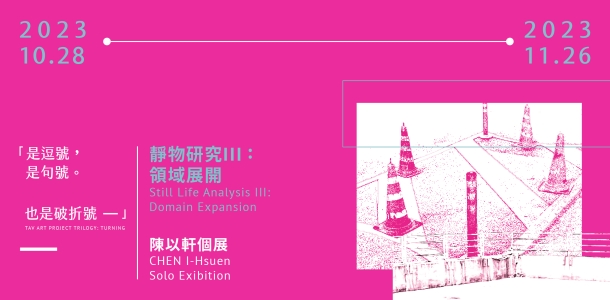News
Photo Credit: Ze Wei
Still Life Analysis III: Domain Expansion–CHEN I-Hsuen Solo Exhibition
2023/10/31

Time|11:00-18:00 (Closed on Monday)
Venue|Taipie Artist Village, Barry Room
Artist|CHEN I-Hsuen
Opening Tour|10.28(Sat.) 15:00
Artist Statement
Taken from the well-known Japanese action anime series Jujutsu Kaisen, the exhibition title Still Life Analysis III: Domain Expansion is deliberately “chunibyo” in its naming. Within this story about jujutsu sorcerers, the highest-level of special combat skill is called “Domain Expansion”. Sorcerers can create a specific spatial domain within a certain space, where they can enhance their abilities and expand on various given advantages; when an opponent is within this domain, all are inevitably defeated as they are unable to defend themselves against any attacks.
The authoritative rules of territories in open spaces often have a subtle yet profound influence on the behavior patterns of everyone within; while individuals still have autonomy over their bodies, they nevertheless automatically conform to the narratives and norms imposed by a given surrounding space. Amongst all, “boundary objects” can be considered the most typical spatial regulators. Coined by the artist himself, the term “boundary objects” refers to the various tools or signs used to define boundaries in open spaces, such as retractable barriers, traffic cones, yellow construction warning tape, “Do Not Enter” signs, or even potted plants used to reserve spaces ahead. These “boundary objects” withhold rigid territorial division function and therefore possess a fascinating quality of representing public authority as well–much like the “cursed objects” in Jujutsu Kaisen that possess direct and effortless control over the movement of people’s bodies and minds in the story.
Still Life Analysis III: Domain Expansion thus results from such a contemplation. Artist Chen I-Hsuen compiles three years’ worth of photography projects on “boundary objects”, including Soft Quarantine (2020) shot at Tokyo, Japan, during the pandemic, Torn Seat Pads in Taipei (2022) presented at Taipei Artist Village (TAV) last year, as well as this year’s Domains (2023) series–all which closely examines the various aspects related to “boundary objects” by using the camera as a tool to selectively frame and highlight different boundaries. In addition to showcasing Chen’s “boundary object” photography, the exhibition venue itself is also surrounded by physical “boundary objects” that attempt to “unfold” various “territories”. For example, items such as retractable barriers are used instead of the expected walls and pathways at the exhibition venue, which open up the walls to utilize the gap between the inner and outer walls to display smaller photos that require the audience’s close observation; here, “boundary objects” are used as presentation tools to display Chen’s photography. Through such a combination of photography and spatial installation, the artist intends to highlight concepts that include but are not limited to boundaries that are set between public and private domains, touching on themes such as human conformity, spatial openness, freedom and restrictions, and the politics of territories–all the while commemorating the impending closing and relocation of the TAV space as well.
______________________________________
1 Chūnibyō (中二病) is a Japanese colloquial term used to describe early teens who have grandiose delusions, who desperately want to stand out, and who have convinced themselves that they have hidden knowledge or secret powers. Loosely translates to “eighth-grader syndrome” in English.
Artist’s Introduction
Chen I-Hsuen is the recipient of the Visual Arts Award of the 18th Taishin Arts Award. He holds an MFA from the Pratt Institute, New York. Chen’s creative journey began with photography, and he continues to experiment with the relationship between images and different mediums through various approaches such as street photography, video installation, and performance theater.
He has participated in the 2016 Taipei Biennial, with his photography work showcased at major photography festivals and exhibitions, including the New York Photo Festival, Singapore International Photography Festival, Lianzhou Foto Festival, JIMEI ARLES International Photography Festival, and the Tainan International Foto Festival. Chen has also held solo exhibitions at the hpgrp GALLERY NEW YORK, Kuandu Museum of Fine Arts, Bamboo Curtain Studio, Taipei Fine Arts Museum, Fotoaura Institute of Photography, and Hong-gah Museum. His works are featured in the Permanent Collections at the The Museum of Fine Arts, Houston and the Kadist Collection.
Executive|Taipei Artist Village
Supervisor|Ministry of Culture, Taipei City Government
Organizer|The Department of Cultural Affairs under the Taipei City Government, Taipei Culture Foundation